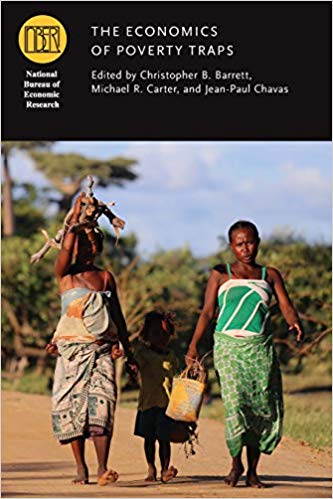What circumstances or behaviors turn poverty into a cycle that perpetuates across generations? The answer to this question carries especially important implications for the design and evaluation of policies and projects intended to reduce poverty. Yet a major challenge analysts and policymakers face in understanding poverty traps is the sheer number of mechanisms—not just financial, but also environmental, physical, and psychological—that may contribute to the persistence of poverty all over the world.
The research in this volume explores the hypothesis that poverty is self-reinforcing because the equilibrium behaviors of the poor perpetuate low standards of living. Contributions explore the dynamic, complex processes by which households accumulate assets and increase their productivity and earnings potential, as well as the conditions under which some individuals, groups, and economies struggle to escape poverty. Investigating the full range of phenomena that combine to generate poverty traps—gleaned from behavioral, health, and resource economics as well as the sociology, psychology, and environmental literatures—chapters in this volume also present new evidence that highlights both the insights and the limits of a poverty trap lens.
The framework introduced in this volume provides a robust platform for studying well-being dynamics in developing economies.
چکیده فارسی
چه شرایط یا رفتارهایی فقر را به چرخه ای تبدیل می کند که بین نسل ها تداوم می یابد؟ پاسخ به این سوال پیامدهای مهمی را برای طراحی و ارزیابی سیاستها و پروژههای کاهش فقر به همراه دارد. با این حال، چالش عمده ای که تحلیلگران و سیاست گذاران در درک تله های فقر با آن روبرو هستند، تعداد زیادی مکانیسم - نه فقط مالی، بلکه محیطی، فیزیکی و روانی- است که ممکن است به تداوم فقر در سراسر جهان کمک کند.
تحقیق در این جلد این فرضیه را بررسی میکند که فقر خودتقویتکننده است زیرا رفتارهای تعادلی فقرا استانداردهای پایین زندگی را تداوم میبخشد. مشارکتها فرآیندهای پویا و پیچیدهای را بررسی میکنند که از طریق آن خانوارها داراییها را جمع میکنند و بهرهوری و پتانسیل درآمد خود را افزایش میدهند، و همچنین شرایطی را که تحت آن برخی افراد، گروهها و اقتصادها برای فرار از فقر تلاش میکنند. بررسی طیف کاملی از پدیدههایی که ترکیب میشوند و تلههای فقر را ایجاد میکنند - که از اقتصاد رفتاری، سلامت، و منابع و همچنین ادبیات جامعهشناسی، روانشناسی و محیطزیست جمعآوری شدهاند - فصلهای این جلد نیز شواهد جدیدی ارائه میدهند که هم بینشها و هم محدودیتها را برجسته میکنند. لنز تله فقر.
چارچوب معرفی شده در این جلد، بستری قوی برای مطالعه پویایی های رفاه در اقتصادهای در حال توسعه فراهم می کند.
ادامه ...
بستن ...
Ebook details:
عنوان: The Economics of Poverty Traps (National Bureau of Economic Research Conference Report)
نویسنده: Economics Books @ Amazon.com
ناشر: University of Chicago Press; First edition (December 7, 2018)
زبان: English
شابک: 022657430X, 978-0226574301
حجم: 3 Mb
فرمت: True Pdf
ادامه ...
بستن ...










